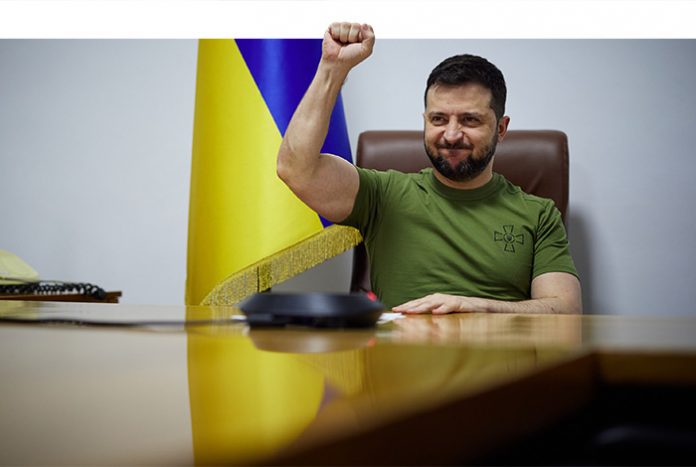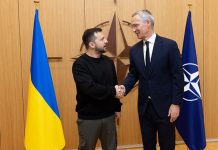“It was reasonable for Ukraine to assume that Russia would not invade its neighbour again in 2022 and for Russia to expect Ukrainian President Zelensky, a former comic actor, to flee rather than become a latter-day Winston Churchill; but both were wrong. Which is why Clausewitz contends that reason is only one of the factors that drive war.” Brigadier Gerhard Wheeler.
CHACR’s latest Commentary asks what it is about the Russo-Ukrainian War that makes it so difficult to confidently forecast and ponders if the answer lies in the writings of the 19th century military philosopher Carl von Clausewitz?
Read the digital document above, download a copy by clicking here or continuing reading below.
WHY is the outcome of the Russo-Ukrainian War so hard to predict? Compared with wars of the past, today’s analysts have access to reams of intelligence. Real-time imagery of the war – from sources as diverse as satellite cameras and TikTok videos – is freely available. Yet, few serious military commentators will offer any prediction more precise than a set of scenarios, ranging widely from a decisive victory for either side to an uneasy stalemate, to an attritional war lasting for years. What is it about this war that makes it so resistant to confident forecasts? Does the answer lie in the writings of the 19th-century military philosopher Carl von Clausewitz?
Without Clausewitz’s insights, it would be reasonable to assume that the outcome of the conflict in Ukraine remains so difficult to call because, despite being awash with data, our vision of the truth is still clouded by the fog of war. After all, both sides are not only fighting a military campaign but also an information war. Their public narratives are skewed to support their goals; and audiences, both at home and abroad, are seduced into echo chambers that affirm their existing beliefs. It is also of course impossible to read the minds of the war leaders of each side. But history suggests that even if we could, this knowledge would not help us predict the war’s course or outcome. Looking at the Ukraine conflict through a Clausewitz lens reveals the powerful forces that make it inherently unstable.
Clausewitz described war as “a fascinating trinity”, composed of reason, luck and emotion. As a Prussian general who fought in the Napoleonic wars, he drew on first-hand experience of the military clashes of great powers and was influenced by the Romantic movement, the dominant intellectual fashion of his time. Reacting against the ideas of the 18th-century Enlightenment, which had emphasised the primacy of logic and reason, the Romantics embraced the powers of nature and human emotion. He wrote On War, his weighty tome on his ideas about conflict, after serving as an officer on the Russian staff during Napoleon Bonaparte’s ill-fated campaign of 1812 to invade Russia (and published posthumously). In it he described the “trinity” as: “Composed of primordial violence, hatred, and enmity, which are to be regarded as a blind natural force; of the play of chance and probability within which the creative spirit is free to roam; and of its element of subordination, as an instrument of policy, which makes it subject to reason alone.”
He goes on to ascribe each aspect of the trinity to another unlabelled trinity of people, army and government, which the first English-speaking scholars of On War popularised as “Clausewitz’s trinity” but which deeper analysis of the original German text now show is subordinate to the central conceptual trinity of reason, luck and emotion.
Although Clausewitz is widely regarded as the most influential of military thinkers, some argue that his opinions do not always apply to the complex wars of today: his critics point out that his insights are only relevant to wars between nation states or empires that comprise of a people, army and government. They contend that conflicts like the war in Syria, which involve a raft of non-state actors, do not fit his 19th-century view of conflict. But today’s Russo-Ukrainian War would feel familiar to Clausewitz and fits his model of war between states.
Clausewitz’s original thesis on the nature of war was that “war is an act of force, and there is no logical limit to the application of that force”. But On War appears to be written in the dialectical scheme developed by his contemporary philosopher Friedrich Hegel so his thesis would be countered by an antithesis to produce a synthesis. Unfortunately, On War was unfinished but it is likely that Clausewitz’s unlabelled antithesis is that “war, therefore, is an act of policy” or more famously that “war is the continuation of politics with other means”. Either way, his trinity of war can probably be regarded as the synthesis of his argument that war is neither a vicious spiral of violence nor an act of reasoned policy, but a blend of both.
There is no doubt that reason plays a role in war. Each side devises strategies rooted in logical deductions. They make assumptions born of rigorous analysis. They justify expected sacrifices in blood and treasure against political calculations that weigh the benefits of victory against the losses of defeat. They accept ambiguity but believe that they can adapt to unexpected changes by devising rational contingency plans and deducing lessons faster than their enemy. As such they appear to act as if war is primarily subordinate to their reasoned policies. But it was reasonable for Ukraine to assume that Russia would not invade its neighbour again in 2022 and for Russia to expect Ukrainian President Zelensky, a former comic actor, to flee rather than become a latter-day Winston Churchill; but both were wrong. Which is why Clausewitz contends that reason is only one of the factors that drive war.
Anyone who has experienced war will understand why Clausewitz has included “chance and probability” in his trinity. Luck plays an out-sized role in war because the normal rules no longer apply. The safeguards that protect us all in peacetime are removed. Stressed leaders make mistakes. Communications fail. Missiles miss. The stakes are raised so high that even the most cautious are prepared to risk everything. It is an environment that rewards bold creativity but also where victory and defeat can flip on the toss of a coin. One only needs to look at how General Dwight Eisenhower’s gamble to delay D-Day by one day avoided storms in the English Channel and thus saved the Allied landings at Normandy from almost certain disaster in 1944. Luck is playing a role in Ukraine too – Rafael Grossi, the director general of the International Atomic Energy Authority, said on 24th January 2023 “I don’t know for how long we are going to be lucky in avoiding a nuclear incident”, referring to the Zaporizhzhia power plant. It is no wonder that Napoleon was said to have asked about a general “I know he is skillful but is he lucky?”; even if the line may have been misattributed – the closest written record of the quote assigns it to a 17th-century Italian cardinal – the sentiment rings true.
Emotion is undoubtedly the third element of Clausewitz’s trinity because no other human endeavour comes close to stoking the passions of the people than war. Violence, fear and propaganda can easily lead to hatred or even dehumanisation of the enemy. Combat can be both terrifying and exhilarating. Comradeship under fire can heighten feelings of love, honour and respect. Courage can inspire confidence in others. Threats often provoke defiance as proud populations rally around their flags. However, once ignited, combustible emotions can be hard to extinguish. Compromise in peace negotiations can be seen as dishonouring the sacrifice of the fallen. The desire to avoid humiliation may easily lead to unwarranted escalation or extend conflicts beyond reason. Trying to prove that emotional motivations can trump rational policy making will always be contentious but it is perhaps not difficult to imagine that the need to achieve what US President Richard Nixon described in 1973 as “Peace with Honor” prolonged the Vietnam War unnecessarily. There is little doubt that strong morale has allowed Ukraine to resist its much bigger aggressor to date but it may also later constrain its leader’s room for manoeuvre in any future negotiations with Russia.
The Russo-Ukrainian War will therefore not end in the way that either side expected when it began. To use a metaphor employed by Clausewitz, “it will swing like an object suspended between three magnets” of reason, luck and emotion until someone relents and cuts it free. This is why war games should be seen as being as useful as games of poker played with Monopoly money; they can provide some insights but never predict the true course of a real war. It is also why, like Napoleon, Vladimir Putin will learn that those who believe they can master war to serve their ambitions of conquest will eventually become its slave.





